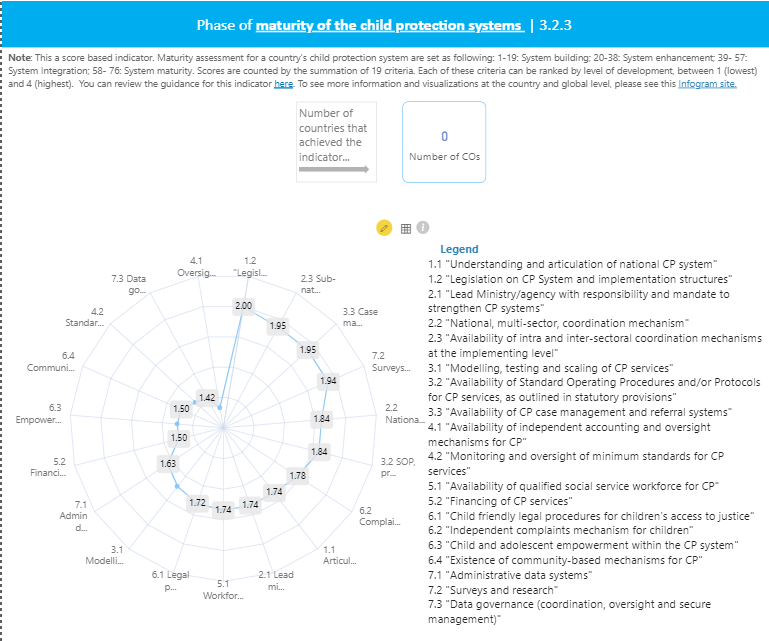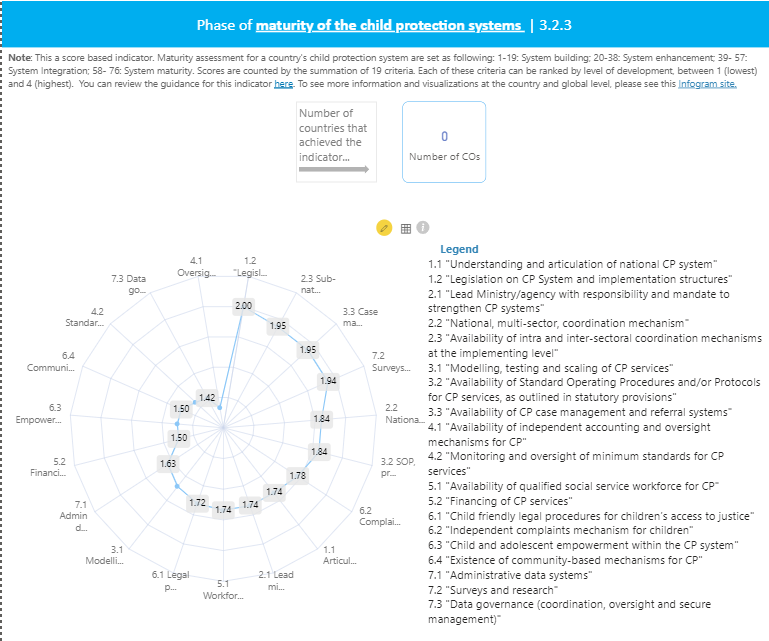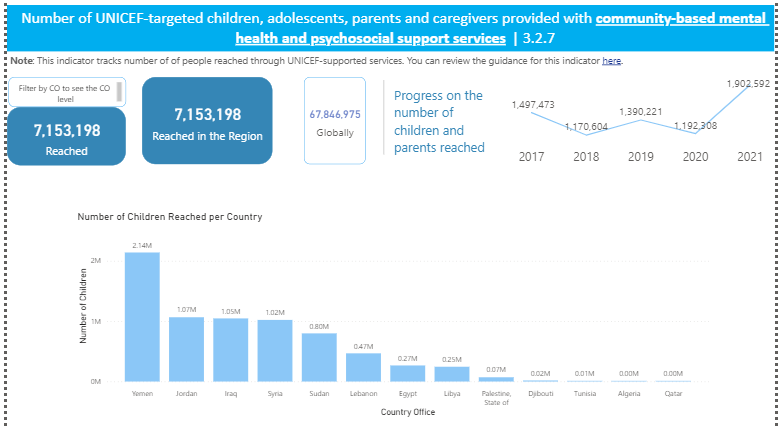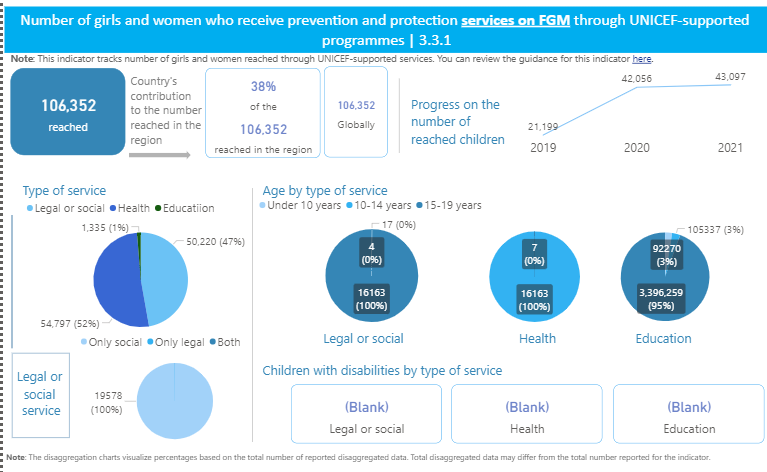Consultancy: Developing a dashboard for UNICEF Middle East and North Africa Regional Accelerator Indicators, 45 days (Home – Based)

UNICEF works in some of the world’s toughest places, to reach the world’s most disadvantaged children. To save their lives. To defend their rights. To help them fulfill their potential.
Across 190 countries and territories, we work for every child, everywhere, every day, to build a better world for everyone.
And we never give up.
For every child, Happiness
Purpose of the job:
The Middle East and North Africa (MENA) is home to over 180 million children and UNICEF offices in each country work to address issues around child rights deprivations. In 2019, MENA regional office (RO) and country offices (COs) co-created the ‘Regional Accelerators’ based on the selected programme areas where the region sees severe child rights deprivations and where UNICEF has comparative advantages to address them. MENA Regional Accelerators are categorized in the following areas:
(1) Strengthening Primary Health Care services to provide integrated package of health and nutrition services for children’s optimal survival growth and development for all including the most vulnerable in the sustainable manner. (* Nutrition will be separated as a stand-alone category this year)
(2) Improving adolescent girls’ and boys’ skills, learning and employability right from early childhood, and taking advantage of Generation Unlimited
(3) Addressing violence against children, especially in homes, schools and institutions
(4) Scaling up UNICEF’s specific programmatic response to the climate crisis including water scarcity
(5) Expanding social protection national systems to reduce multi-dimensional poverty and vulnerabilities
In 2021, RO and COs have agreed on set of outcome and output indicators from UNICEF Core Standard Indicators (CSIs) and Standard Indicators (SIs) to monitor the progress of Regional Accelerator. Outcome indicators are selected from SIs and Output indicators are selected from the combination of CSIs and SIs. CSI has multiple data points, which are the source of the CSI value calculation and could be used to see the trends in certain aspects of the CSI. The analysis of CSI datapoints will inform and influence the programme adjustments and ensure the accountability of Country Offices and Regional office in achieving agreed results. Through regular corporate end year reporting process, at the start of 2023, we have baselines (as of 2021) as well as actual results (2022) for CSIs.
Prior to 2022, COs report their progress toward UNICEF Strategic Plan (2018 – 2021) using Strategic Monitoring Questions (SMQs), which have been renamed as CSI data points to calculate CSI values in 2022. MENA Regional Office would like to link the data from SMQs historical data with CSI data points for selected CSIs to deepen the analysis to the extent possible.
Using all the data sources mentioned above, the dashboard aims to present the trend of SI values for outcome level and CSI/SI values, the CSI data points (formerly referred to SMQ values) for output level. In addition, country demographic data, map, and other useful data will be drawn from UNICEF data warehouse as part of the country profile page to give context to the data in the dashboard.
The primary objective of this consultancy is to develop a dashboard with a regional overview as well as country level views for the five MENA regional accelerators visualizing the following;
1) Data from 28 SIs illustrate the trend of outcome-level indicators.
2) Data from CSIs (including 38 CSI values and 220 data points which are used to calculate the associated CSI values) and 2 SIs used for the regional accelerator output level monitoring. (For the list of Accelerator-related CSIs and associated data points, please access CSIs and data points https://www.dropbox.com/scl/fi/ab8f6u3omlxt25tnns5wq/MENARO-Accelerator-Indicators_21092022-shared-with-COs-Data-Points_v2.xlsx?dl=0&rlkey=nn5j8sme7hgfhkgux7032mscq)
3) Demographic, map, and other key information of the country or region.
For 137 CSI data points and 8 Standard Indicators, there are historical data from the previous UNICEF Strategic Plan 2018-2021 (SMQs data, standard indicators, and other relevant data) and this will be also added to show the historical trend in the dashboard. SME formatted report can be found here SMQ formatted data (https://www.dropbox.com/s/7cx9l4ynr9hmu2j/SMQ%20formatted%20report%20.zip?dl=0)
The Dashboard should be built using existing corporate tools and data linked to existing databases/reporting formats so that these can be updated in the future (2023 onward) automatically from the data source.
The consultancy also should deliver a manual and training session on the Dashboard, including updating and maintenance, for UNICEF MENA regional office staff to ensure the uptake and sustainability of the system.
The consultants will be expected to demonstrate the Dashboard to the HQ colleagues and MENARO senior management to ensure the final product will fulfill the UNICEF requirements.
Data can be accessed through:
(1) CSI data are available through UNICEF’s Internal SQL servers (TBC) or Excel-based formatted reports in case external access is restricted CSI formatted data (https://www.dropbox.com/s/gl2m5xmh2sbxboz/CSI%20formatted%20report%20.zip?dl=0)
(2) Data on demographics, and selected SDG indicators/ Standard Indicators are available through the MENA data portal and associated rest API: sdmx.unicef.org.
Scope of Work:
1) The production plan
This will comprise a desk review of existing documentation and existing data visualizations at UNICEF including the selected SIs, CSIs, CSI data points, SMQs, review of methodology note, calculation method for each CSIs, possible visualization options MENARO prepared, review of the link between the SMQs and CSI data points and any other document illustrates the technical requirements for the dashboard development. The information required for the dashboard, including the prototype MENARO generated for this project (Image below), will be shared with the consultant(s) by MENARO.




Image: An example of dashboard prototype MENARO generated
The production plan should include the technical proposal including the proposed dashboard structure, system for the dashboard, work process, visualization options for each Sis, CSIs and data points and the timeline for developing the Dashboard.
As for the system, our preference remains Power BI to visualize the data analysis; however, if it is deemed efficient, reasonable, and sustainable, we are flexible for suggestions to use other open-source software (e.g., R or Python) as interim steps before importing to Power BI.
The plan should also include multiple stages of consultation (within MENARO technical team, MENARO Senior management, HQ, and COs) to ensure the final product will meet the requirements of UNICEF.
2) Draft dashboard and presentation at the consultation meetings in MENARO and with HQ with summary of key findings from data. Draft (close to final) should be ready by 31 May 2023
3) Final and functional dashboard should be ready by latest 12 June 2023.
4) Manual, backend data and any code used to prepare data for the dashboard by end of June 2023.
5) Technical training for UNICEF staff by end of June 2023.
|
Work Assignments Overview |
Deliverables/Outputs |
Delivery deadline |
|
Production plan (max 15 pages), outlining the required information in the objectives, scope and methodology of this TOR |
Production plan |
Max 5 working days |
|
Presentation at the consultation meetings in MENARO and with HQ and submission of draft dashboard and summary of key findings |
|
Max 15 working days, by 25 May 2023 |
|
Final and functional Dashboard |
Final and functional dashboard |
Max 15 days By latest 8 June |
|
Manual, backend data, one technical training for UNICEF staff |
Manual of dashboard development, maintenance and update One training workshop Training report |
Max 10 days, by 30 June 2023 |
Minimum Qualifications required:
- Masters in relevant fields such as Information Management Technology, Data Science, Data Analysis, Statistics, Social Science.
- Proven experience in using data visualization software (Power BI, Tableau, etc.)
- Proven experience in delivering integrated high-quality services in graphic and dashboard design and development
- Proven expertise in the development of online and offline database products, including customized graphical user interfaces and the integration of these database products to produce high-quality, appealing data dissemination products and visualizations
- Ability to analyse and interpret information and data (the experience in this area could be considered positively to compliment the education qualifications)
- Ability to work independently
- Excellent project management, time management and communication skills, fluent in English (French and Arabic fluency is an asset.)
- Familiarity with UNICEF mandate and the Sustainable Development Goals preferred.
- Experience working for UN is an asset.
Knowledge/Expertise/Skills required :
- The candidates to share minimum 3 sample dashboards they have led the development process with technical specifications (e.g use of PowerBI or else)
- The candidates to share minimum 2 references from the previous dashboard development projects.
For every Child, you demonstrate…
UNICEF's values of Care, Respect, Integrity, Trust, Accountability, and Sustainability (CRITAS).
To view our competency framework, please visit here.
UNICEF is here to serve the world’s most disadvantaged children and our global workforce must reflect the diversity of those children. The UNICEF family is committed to include everyone, irrespective of their race/ethnicity, age, disability, gender identity, sexual orientation, religion, nationality, socio-economic background, or any other personal characteristic.
UNICEF offers reasonable accommodation for consultants/individual contractors with disabilities. This may include, for example, accessible software, travel assistance for missions or personal attendants. We encourage you to disclose your disability during your application in case you need reasonable accommodation during the selection process and afterwards in your assignment.
UNICEF has a zero-tolerance policy on conduct that is incompatible with the aims and objectives of the United Nations and UNICEF, including sexual exploitation and abuse, sexual harassment, abuse of authority and discrimination. UNICEF also adheres to strict child safeguarding principles. All selected candidates will be expected to adhere to these standards and principles and will therefore undergo rigorous reference and background checks. Background checks will include the verification of academic credential(s) and employment history. Selected candidates may be required to provide additional information to conduct a background check.
Remarks:
Only shortlisted candidates will be contacted and advance to the next stage of the selection process.
Individuals engaged under a consultancy or individual contract will not be considered “staff members” under the Staff Regulations and Rules of the United Nations and UNICEF’s policies and procedures, and will not be entitled to benefits provided therein (such as leave entitlements and medical insurance coverage). Their conditions of service will be governed by their contract and the General Conditions of Contracts for the Services of Consultants and Individual Contractors. Consultants and individual contractors are responsible for determining their tax liabilities and for the payment of any taxes and/or duties, in accordance with local or other applicable laws.
The selected candidate is solely responsible to ensure that the visa (applicable) and health insurance required to perform the duties of the contract are valid for the entire period of the contract. Selected candidates are subject to confirmation of fully-vaccinated status against SARS-CoV-2 (Covid-19) with a World Health Organization (WHO)-endorsed vaccine, which must be met prior to taking up the assignment. It does not apply to consultants who will work remotely and are not expected to work on or visit UNICEF premises, programme delivery locations or directly interact with communities UNICEF works with, nor to travel to perform functions for UNICEF for the duration of their consultancy contracts.




